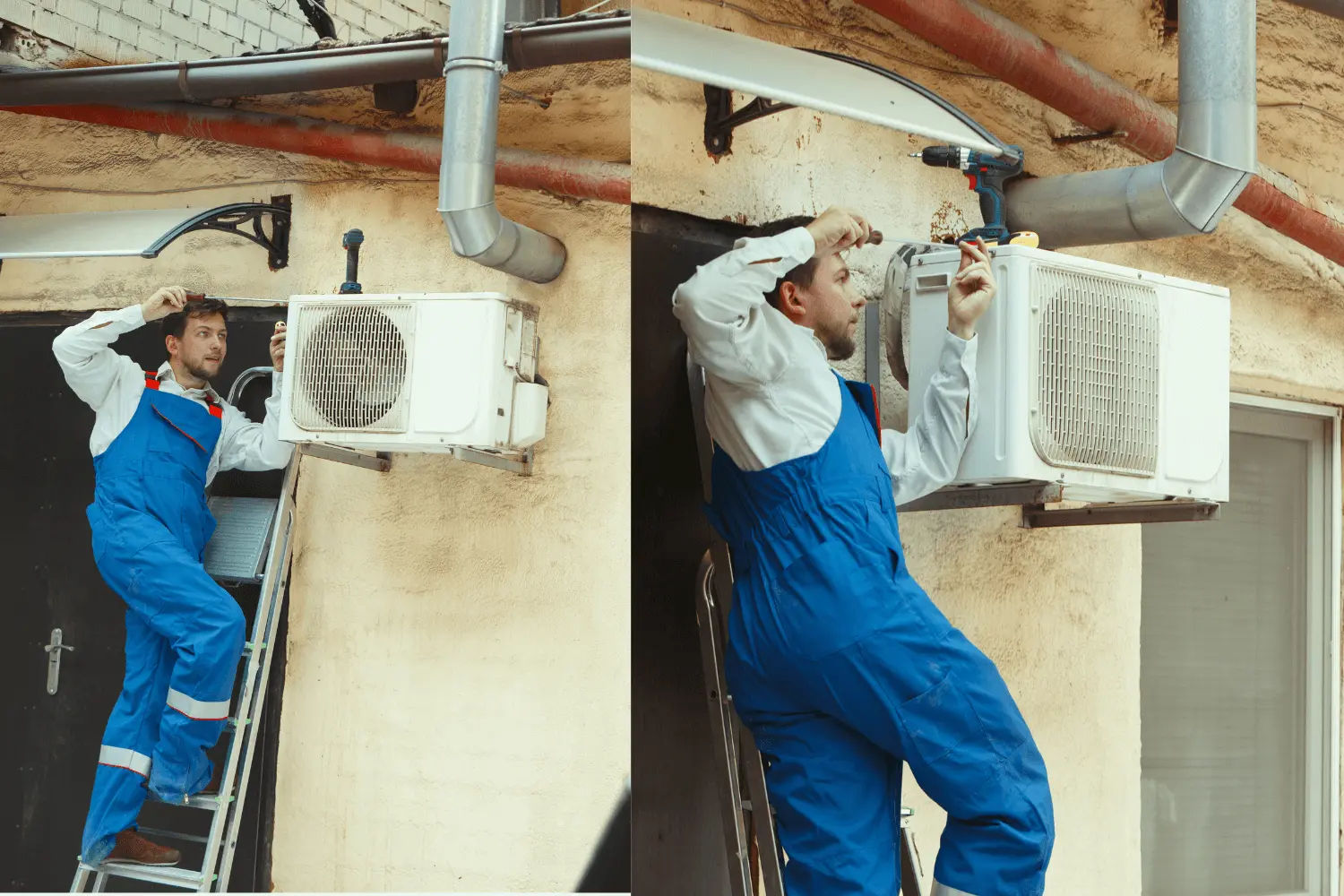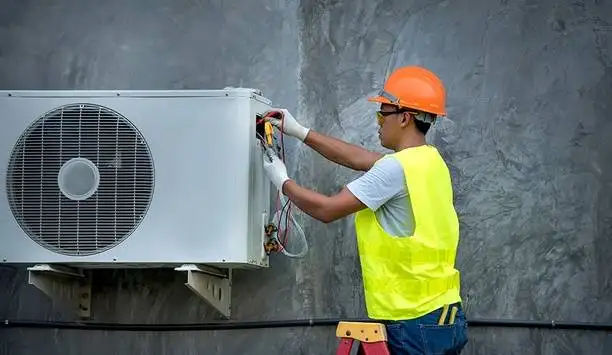5 HVAC Safety Tips Techs Must Remember and Follow At All Times

A career as an HVAC technician offers great job stability, interesting challenges, and a great salary on average. You’ll always find plenty of work opportunities and the ability to progress in this career path. Those who succeed in this career undergo proper training from experienced leaders. While there are many benefits to working as an HVAC technician, such a job requires a high level of caution and attention to detail. As a HVAC business owner, however, the task is even more challenging. Along with all these things, you need to be careful about your technicians’ security on the job. And that is why awareness of HVAC safety tips and regulations is a crucial element for your business.
HVAC technicians are regularly exposed to on-the-job hazards and risky situations. Safety is a must HVAC technician, no matter how seemingly basic the task at hand might seem. For this reason, technicians must be aware of the safety guidelines and always keep them in mind.
To help you learn and remember the most important ones, we have compiled a list of five HVAC safety tips. Go through them and try to follow them each time your field technicians work on an assignment.
Ready to get started with Field Promax?
Sign Up Free1. Assess the Situation Before Starting
Protective gear has a purpose. While this gear isn’t always comfortable, it is essential to the job. This gear helps protect HVAC technicians against contaminants and other common on-the-job hazards.
Protective clothing can protect the hands, skin, and body from burns, chemicals, and other potential hazards. For tasks that involve kneeling, crawling, or long hours on hard surfaces, wearing a soft knee brace for everyday support can also help reduce strain and improve comfort on the job. wipping yourself with proper hand protection is critical when handling sharp tools, hot surfaces, or hazardous chemicals. Using high-quality cut resistant gloves designed for specific HVAC tasks can significantly reduce injuries and improve efficiency on the job. For a variety of durable options, check out proper hand protection solutions tailored to different worksite needs. It is important that HVAC technicians protect their bodies from anything that could lead to injuries.
Hard hats are necessary when technicians are working in areas with low-lying beams or potential falling objects. Heavy objects falling on the head can cause serious injuries that hard hats can prevent.
Slip-resistant shoes are one of the most important pieces of safety gear for HVAC technicians. When leaks occur, floors can become wet and slippery. Without slip-resistant shoes, technicians might slip and fall, leading to serious injuries. In some cases, work boots might be required to protect the feet from heavy objects falling on top of them. No matter what the situation is, you should always have the right shoes on hand to keep yourself safe.
Face shields should be worn any time technicians are working with potentially dangerous chemicals and liquids. Respiration masks should also be used when working with unsafe air contaminants. Earplugs should be used any time loud equipment is necessary. Safety glasses are another facial safety device that can protect the eyes from flying debris.
.webp?updatedAt=1746688657196)
In addition to wearing safety gear, you should also look at the situation to make sure you are safe.
Before jumping into a task, take the time to understand and find out any potential HVAC safety hazards that may be present on the job site. Each job is in a unique situation and location, so it’s wise to take the necessary safety precautions beforehand.
While it can be tempting to immediately start a job, it’s better to take the time to get the job done and do it right than to just rush through everything.
2. Always Wear the Right Safety Gear
Protective gear has a purpose. While this gear isn’t always comfortable, it is essential to the job. This gear helps protect HVAC technicians against contaminants and other common on-the-job hazards.
Protective clothing can protect the hands, skin, and body from burns, chemicals, and other potential hazards. uipping yourself with proper hand protection is critical when handling sharp tools, hot surfaces, or hazardous chemicals. Using high-quality cut resistant gloves designed for specific HVAC tasks can significantly reduce injuries and improve efficiency on the job. For a variety of durable options, check out proper hand protection solutions tailored to different worksite needs. It is important that HVAC technicians protect their bodies from anything that could lead to injuries.
Hard hats are necessary when technicians are working in areas with low-lying beams or potential falling objects. Heavy objects falling on the head can cause serious injuries that hard hats can prevent.
Slip-resistant shoes are one of the most important pieces of safety gear for HVAC technicians. When leaks occur, floors can become wet and slippery. Without slip-resistant shoes, technicians might slip and fall, leading to serious injuries. In some cases, work boots might be required to protect the feet from heavy objects falling on top of them. No matter what the situation is, you should always have the right shoes on hand to keep yourself safe.
Face shields should be worn any time technicians are working with potentially dangerous chemicals and liquids. Respiration masks should also be used when working with unsafe air contaminants. Earplugs should be used any time loud equipment is necessary. Safety glasses are another facial safety device that can protect the eyes from flying debris.

3. Double-Check Your Equipment

As you travel from job site to job site, you might lose track of important HVAC tools. Before you head out to any job site, make sure that you have the equipment you need, and that all of this equipment is in proper working order.
Not having the proper equipment can lead to accidents. While you want to get the job done, don’t use improper equipment to complete the task. The safety of the technician is always the most important aspect of any job.
Malfunctioning equipment is also a leading cause of injuries for HVAC technicians. Before using the equipment, check that any power cords are in good condition. Make sure moving parts are working properly as well.
Want a personalized demo?
See how Field Promax can transform your field operations
4. Handle Chemicals Very Carefully

As one of the most common hazards in the workplace, dangerous chemicals are a risk that can be found on most work sites. Some of these chemicals include cleaning liquids, solvents, refrigerants, and detergents.
Chemical exposure to potential hazards such as cleaning liquids and gas cylinder refrigerants was found to be the most common on HVAC worksites. Chemical refrigerants, when handled incorrectly, can lead to burns and serious injuries.
Combustible chemicals can cause explosions if proper care isn’t taken in their treatment. This is why it’s important to not only wear the right protective gear but to practice chemical safety at all times. Never mix chemicals, even if they seem to be similar. Keep all chemicals in their original containers to avoid bodily harm. And make sure you follow signage and instructions each time you handle chemicals of any kind.
If you have any uncertainty about a particular chemical substance, educate yourself or ask a mentor or other expert before you handle it. It’s always better to be safe than sorry.
5. Be Careful with Electrical Equipment to Avoid Shock

Since dealing with electrical equipment is par for the course as an HVAC technician, you should take the necessary precautions to minimize any risk of electrocution or electric shock.
Electric shock is most likely to occur when you’re dealing with air conditioner safety, especially a water leak within an HVAC system. When water drips down onto electric parts within the system, the risk of equipment failure and shock is high.
The best thing to do to stay safe when working on a system while water is present is to turn off the main circuit breaker ahead of time. This will keep you safe from electrocution and preserve expensive equipment while you work on it.
Final Words

For HVAC safety tips and electrical hazards, there is one, and only one thumb rule–
Take Your Time — Don’t Take Shortcuts.
While your end goal might be to move on to the next job, rushing can not only mean you do a botched job and end up having to come back later but can also put you ask risk. Taking shortcuts can lead to accidents that can put you in a dangerous situation, expose you to chemicals, and get you hurt. Take a few extra minutes to be sure the job is done right and safely; you’ll end up thanking yourself later.
With proper HVAC safety tips training, adequate experience, and wisdom often comes the skill to ensure quality work with minimum time. However, some technicians tend to take shortcuts just to save some time. But remember, when it comes to HVAC safety tips, shortcuts can be dangerous.
So, make sure your technicians stick to the fundamentals. Things like climbing a ladder as you were taught early on, or using a harness when working at higher heights can make a major difference in safety. Following the basics is tried and true.
Another important thing for HVAC technicians– always be alert to recognize fatigue. This is one of the most trivial things that can lead to massive HVAC security hazards.
When working in hot, cramped, or freezing conditions for hours, it’s important to recognize when you need to take a step back from the job. Take a minute or two away from the job to cool yourself down or warm yourself up. Staying hydrated and fueled up throughout the day can ensure you’re in the best physical condition to handle a job.
If any of your technicians begin to feel lightheaded, overheated, or tired, promptly remove them from a potentially dangerous situation until they feel better.
Now, how do you keep tabs on your technicians to ensure that they are following all these rules in the workplace? The easiest way is to employ field service management software like Field Promax.
The smart field management system comes with a bundle of useful features, such as GPS tracking, employee time-tracking, dynamic team management, equipment tracking, mobile apps for field service technicians, and more.
Powered by these cutting-edge technologies, you can always be on top of your business and ensure complete security and compliance, no matter where you are.
For more information, contact Field Promax
We're here to help you get started